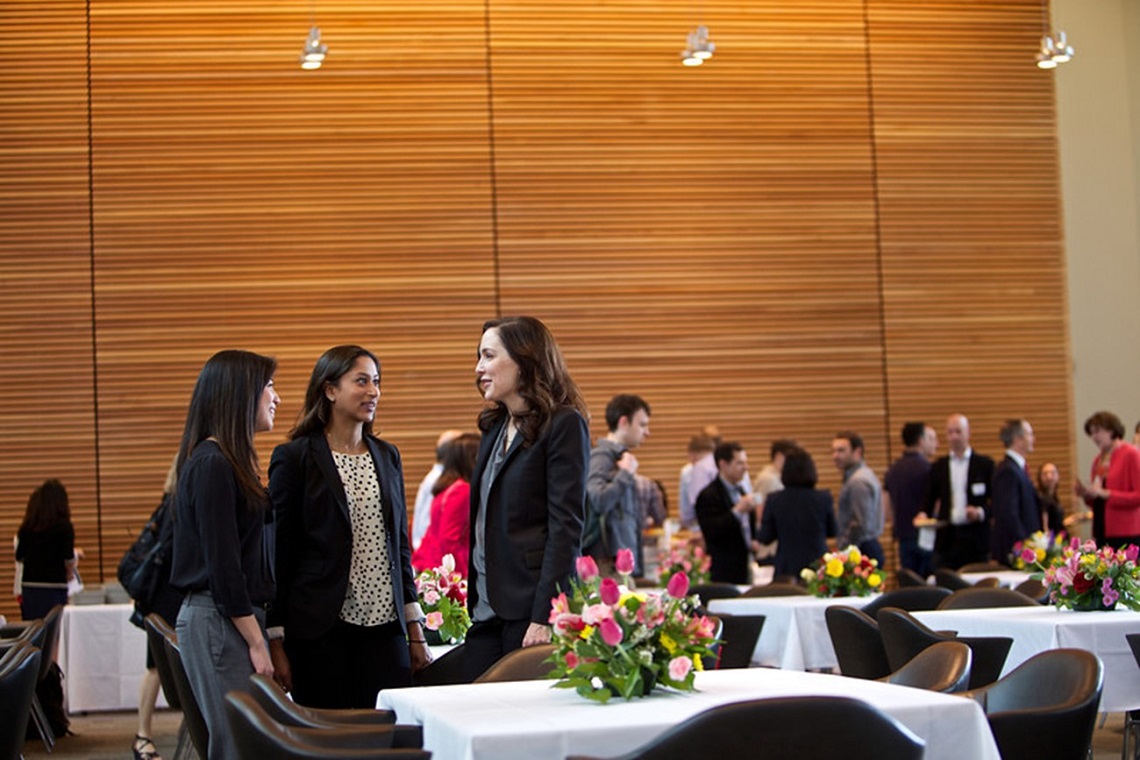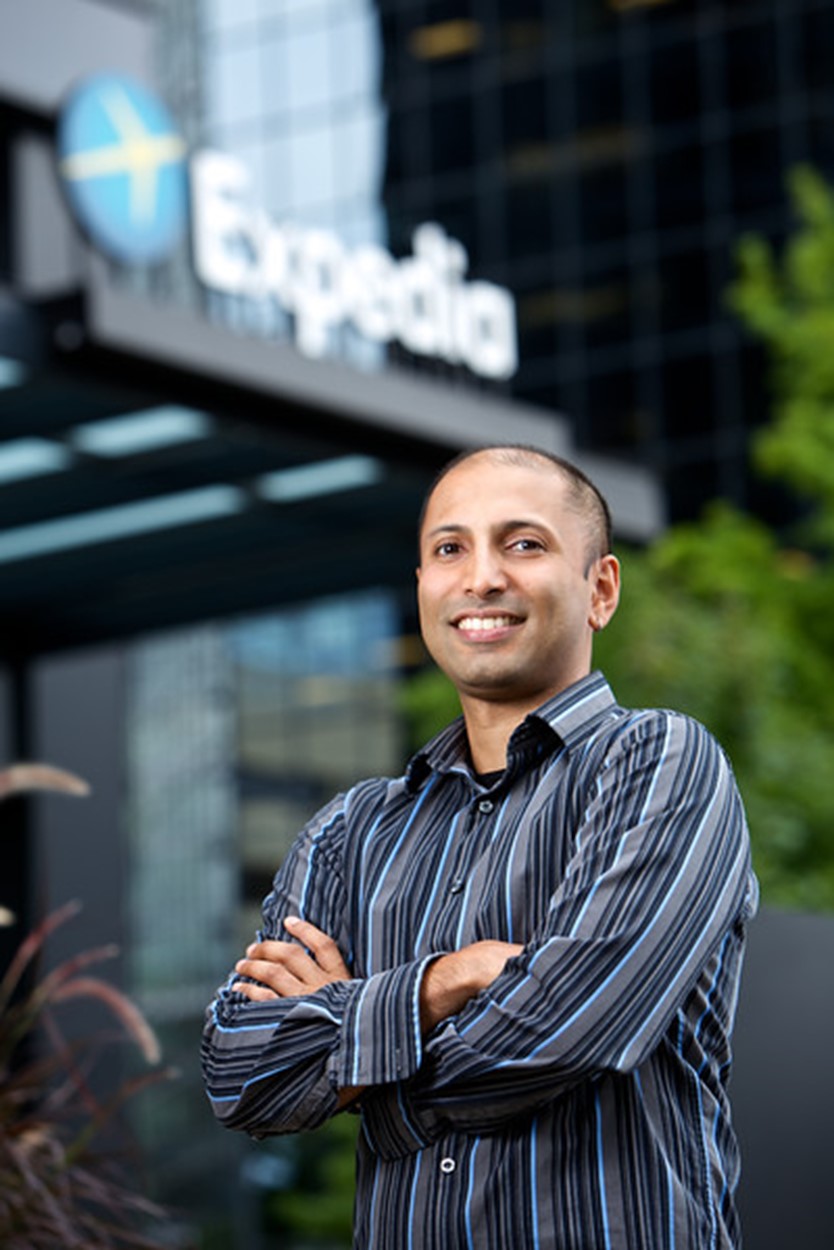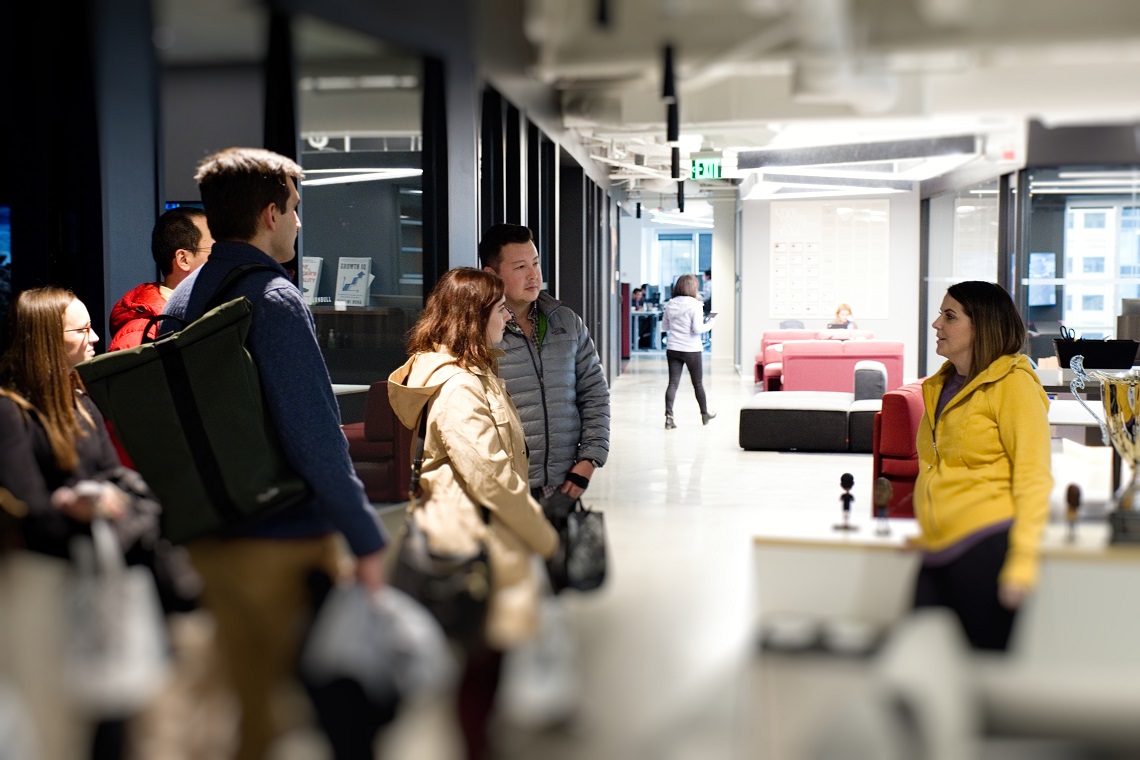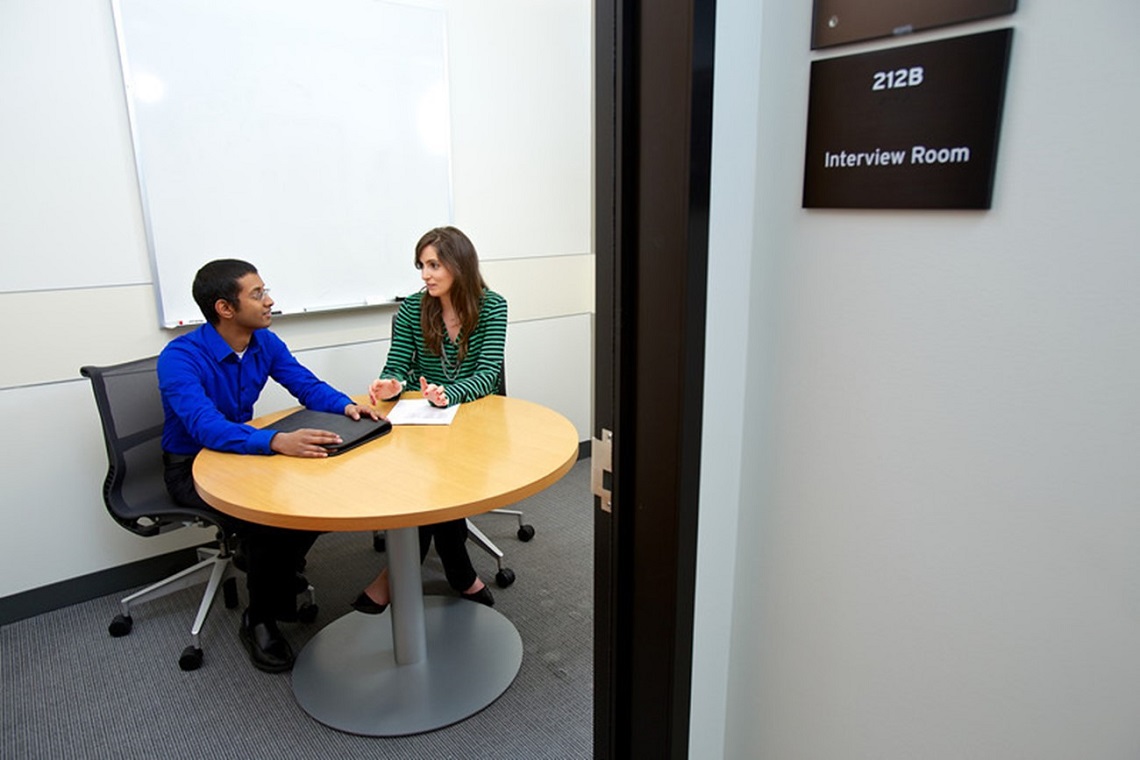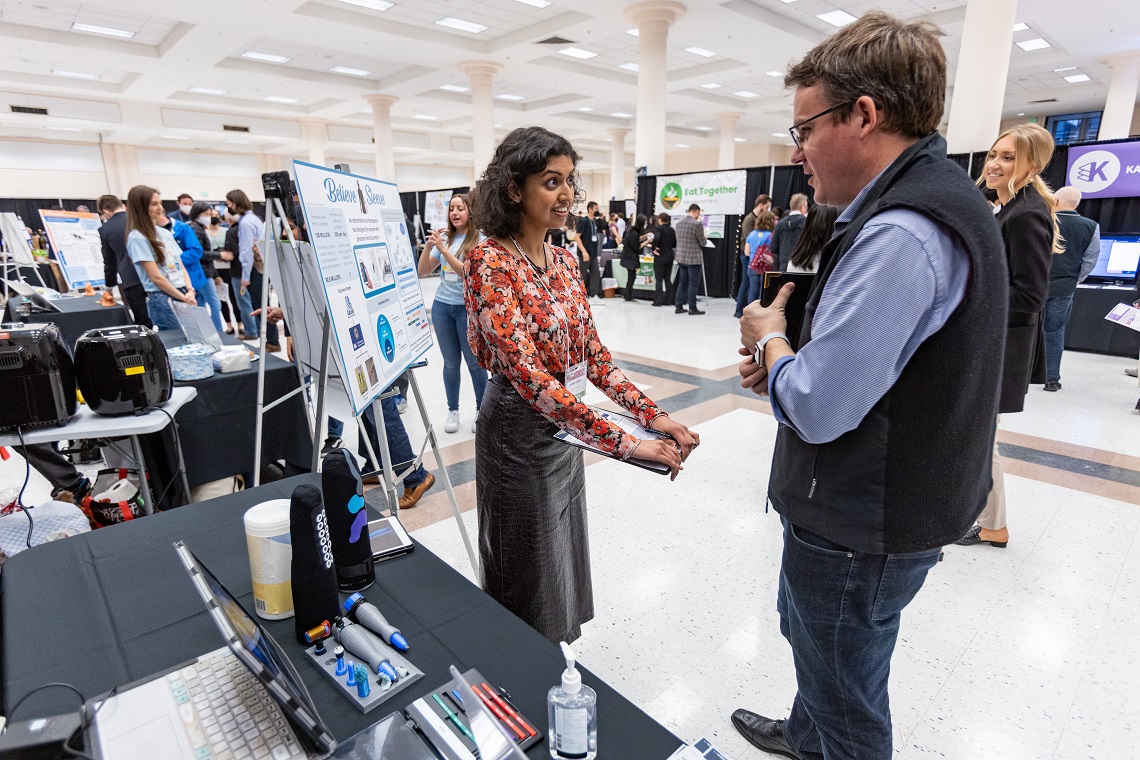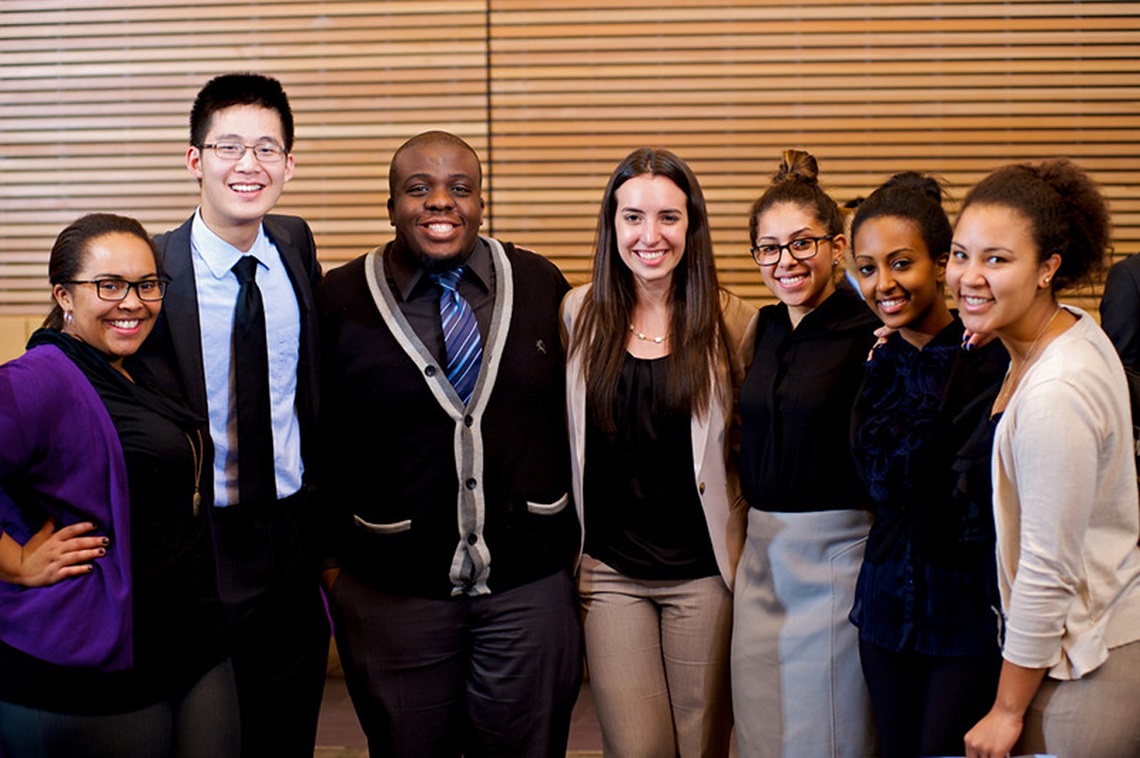Amazon to Zillow
The Foster School’s comprehensive, innovative and personalized approach to career management catalyzes opportunities of a lifetime with some of the world’s best businesses
“Don’t be so humble.”
Jean Gekler, a career coach in the Foster School’s MBA Career Management office, crowds a large whiteboard with adjectives describing Darius Chen, a Foster MBA student transitioning from his career in the US Army Special Forces. He is here to refresh his personal “Brand Essence.”
The process begins with an inventory of professional roles and personal traits. With Gekler’s facilitation, Chen distills the most pertinent into three brand statements then, finally, a tagline: one simple expression of Chen’s professional essence with the economy of a haiku: “Strategic collaborator driven to cultivate excellence in people and organizations.”
Gekler explains that some students use their brand essence statements on their resumes and LinkedIn profiles. Most think of them as background prep for career exploration and interviewing.
“I consider it an exercise in self-reflection,” says Chen. “You don’t understand how valuable that is until you get into the interview process and see that the people getting the best offers are the ones most comfortable and confident and self-aware. Being able to articulate your value in a way that’s compelling, meaningful and genuine—that’s incredibly important.”
Education, plus
This home-grown exercise in self-reflection exemplifies the Foster School’s distinctive approach to career development and management—across every degree program.
It’s an approach that is innovative, proactive, personalized, responsive to market demand, and informed by close relations with classmates, alumni and recruiters.
And, perhaps most importantly, it’s considered part—rather than postscript—of the business curriculum.
“At Foster, we measure our success on much more than providing a fantastic education,” says Dan Poston, assistant dean for graduate programs. “We must open doors to exciting career opportunities, give our students the job search skills to take advantage of those opportunities, and provide a deep network of successful classmates, alumni and industry connections on which our graduates can launch and build a career.”
Foster gold
Nobody does it better than Foster’s MBA Career Management, the gold standard in its industry.
Foster’s full-time MBA job placement rate is perennially ranked among the top schools in the nation (its 95.6 percent placement three months after 2015 graduation places it 2nd among the nation’s top 25-bschools, according to U.S. News). It is one of an elite list of 22 MBA programs whose graduates average more than $110,000 in starting base salary. And Foster leads the nation in placing graduates in technology and consumer products positions.
“The reason for our success is that we’re not a traditional career office,” says Naomi Sanchez, assistant dean for MBA career management. “We do things differently here—both at the individual and the systematic level.”
It begins with the Pro Dev program, a required series of workshops and bootcamps that serves as a 6 a.m. wakeup call to the rigors and realities of the job search. First-year MBAs create a comprehensive leadership and career plan that includes a personal GAP analysis, marketing plan, brand essence and the compilation of a board of advisors.
Need Help?
And this is only the beginning. Sanchez’s shop offers full-time and evening MBAs numerous recruiting and networking events, a high-level mentor program, MBA peer advisors, regional career treks, “Foster Days” at select corporate campuses, job skills workshops and one-on-one career coaching by in-house experts with deep industry experience.
The goal of this investment is to foster competence, confidence and connections—in every student.
“That no-student-left-behind philosophy is pretty unique,” says Sarah Eytinge (MBA 2014), a recruiter at Microsoft. “Other schools offer personalized attention if you ask for it. Foster tracks each student.”
Making connections
Foster also tracks each recruiter. Sanchez’s team tirelessly builds and maintains close ties with the perennial employers of Foster grads—Amazon, Microsoft, Philips, Liberty Mutual, Starbucks, Accenture, Deloitte, among the most active—and less frequent recruiters such as Intel and Goldman Sachs which successfully tapped into Foster’s wide-ranging talent pool last year.
This means frequent check-ins and invitations to recruiters and employer advisory boards. And continuous requests for feedback.
Eytinge appreciates the hustle: “It’s nice to know they’re seeking out the customer and trying to satisfy our needs.”
Paramount among those needs is finding the right MBAs for the job. “Other schools operate on an algorithmic search for qualified candidates,” Eytinge adds. “Foster knows all of their students. And they’re not afraid to recommend or even advocate for them.”
“At the end of the day, it’s about finding individual fit,” Sanchez says. “It’s matchmaking, really. But at a strategic level.”
Move up, change up, start up
Career change is the central objective of full-time MBAs. But students in Foster’s work-compatible programs are also looking to make some kind of significant change.
“Graduate business students don’t just want to learn something new,” says Poston. “They want to transform their career, to make a bigger impact on the world.”
In the Technology Management MBA Program, that transformation can take many forms, from advancement in the same company or industry to a shifting of function or industry to entrepreneurial venturing.
“The classic trajectory is from technologist to strategic manager,” says Susie Buysse, the TMMBA’s senior associate director for career services and company outreach. “We offer tools, frameworks, support and coaching—a breadth of resources for students take their careers to that next level.”
This is not to mention frequent networking opportunities, such as company “Tech Treks” and casual TMMBA Mixers that capitalize on the tightly-knit cohort of TMMBA alumni throughout the region’s tech industry.
One innovation is the TMMBA Job Search Team, facilitated by Buysse.
Viveka Raol (MBA 2015) became a member of the current group of alumni career seekers after her long-time employer, Amgen, shuttered its Seattle office. An experienced research scientist seeking work in product or project management, Raol has found enormous value in the team’s structure, networking, empathy and good humor during a challenging time.
After a run of dead ends, she says her search has been reinvigorated by her teammates’ encouragement to approach the subset of TMMBA alums working in Seattle biotech. That advice has already yielded numerous productive meetings and opened doors. “The TMMBA has been like an extended family,” Raol says. “The support during school and after by my cohort, professors, administrators and alumni has been amazing.
Executive suite
Executive MBAs at Foster, despite their most senior standing, are no less invested in career transformation.
“Foundationally, Executive MBAs are looking for something different,” says Louise Kapustka, executive director of the EMBA Program. “They want to contribute at a more strategic level in their organization or do something completely different for their—or another—organization or industry. Our faculty give them great tools for every business discipline. But we need to give them a forum to explore where they can make the biggest impact, and the career tools to help them get there.”
Heading up that effort is Lewis Lin, the program’s dedicated career and executive coach. Though Executive MBAs share many of the MBA Career Management resources, Lin, a veteran of Google and Microsoft, provides an executive suite of career management services including personalized advising.
“Career reflection is one of the great hidden values of the program,” he says.
Kapustka adds that a more long-term value to career management is the program’s powerful—and welcoming—alumni community which is stocked with senior leaders at the region’s top firms. The network begins with the bonds within each class.
“Very quickly our students come to trust each other in a way they would never have thought possible,” Kapustka says. “Throughout their careers, they become a sounding board, a support group with no ulterior motive.”
Career firsts
The spectrum of job seekers at Foster spans executive level to entry level. Since 2012, the EY Career Center has provided dedicated services to the latter—undergraduates and specialized masters in accounting, information systems and, starting next year, supply chain management.
By necessity, founding director Andy Rabitoy runs more of a volume business than his MBA counterparts. Last year his team hosted 230 events and workshops, 1,300 career advising appointments, and more than 2,300 on-campus interviews by 221 firms. The annual Business Career Fair connected 1,100 students to 129 employers.
Rabitoy’s eight-person team works hard to personalize the proceedings. They find fit for employers. And to students, they impart information, advice and access at every opportunity, from mock interviews to a new career-building elective that explores topics ranging from networking and LinkedIn to branding and emotional intelligence.
But for students who have had little or no experience in the workplace, perhaps the most essential function is getting them out of the classroom. “They know they’re going to get strong academic rigor at Foster that will challenge them, make them think differently,” Rabitoy says. “But that’s not what gets them a career.”
So his team relentlessly pushes internships, case competitions, club leadership, industry treks, informational interviews, and networking events with alumni and recruiters.
It adds up to jobs. A student survey revealed an 85 percent placement rate through Rabitoy’s office last year—to a galaxy of hiring firms, including Deloitte, Accenture, EY, PwC, Alvarez & Marsal, Liberty Mutual, Amazon, Boeing, Wells Fargo, Microsoft, KPMG, Macy’s and many others.
“If we can get our students to be prepared, polished and able to communicate their point of difference,” Rabitoy says, “I know they are going to be successful.”
ENTRE 411
Of course, not every student fits into the corporate mold.
For those of a more entrepreneurial persuasion, the Buerk Center for Entrepreneurship offers coursework, competitions, cross-campus networking, mentoring, even an accelerator—an astounding head start for the student startup.
Some launch their own business. More join another in progress. “There are students who don’t want to be a cog in a big machine,” says Buerk Center director Connie Bourassa-Shaw. “They want to work for a company that has a clear social or innovation mission and an entrepreneurial ethos. They don’t want to be typecast in narrow roles.”
For these, the center collaborates with the career management offices to track students and employers in the startup realm. And it hosts the annual Startup Job Fair that brings to campus smaller but fast-growing companies like Zulily and Porch.
“Entrepreneurial skills serve students in whatever job, industry or organization they pursue,” Bourassa-Shaw adds. “That ability to make a cohesive and compelling pitch, to stand in front of a room and convince people that you know what you’re talking about and can make it so—that’s huge.”
Catalyzing futures
The Foster School’s mission doesn’t end with education. The mosaic of career resources and workshops and coaching sessions and networking opportunities is dedicated to catalyzing meaningful careers and transforming the lives of every student.
Sundas Khalid (BA 2015) is one. She came late to Foster, after immigrating to America from her native Pakistan, having two children and surviving a life-threatening illness. Despite taking some early advice to build her business experience, she struggled to land an internship. So she worked hard with Rabitoy and his team to polish her interview skills, then connected with Amazon through a networking event which led to an internship and now a job in business intelligence—a tale of inspiration she was asked to recount at last year’s Undergraduate Program commencement ceremony.
“Being an immigrant, the first female in my family to graduate college and get a good job, this was a life-changing event,” Khalid says. “I cried a lot that day.”
Such stories of transformation are what drive Rabitoy and Foster’s other career management professionals. Theirs is a privileged place in the lives of students.
“The beauty of working in career management is you get to be a part of some huge defining moments,” he says. “I think this is why you find so many Foster alumni wanting to take part in our events and engage with our students. They want to share in this discovery, to help them with their roadmaps of their lives.”

